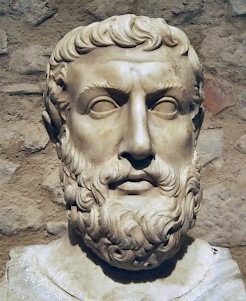Parmenides
Parmenides of Elea (c. 500 BCE): one of the pre-Socratic philosophers of ancient Greece.

Parmenides of Elea was a younger contemporary of Heraclitus of Ephesus, but he lived at the opposite end of the Greek world: in Italy. Both men were intrigued by the immense variety of phenomena, but where Heraclitus discerned order in the chaos, Parmenides pointed out that the endless variety and eternal changes were just an illusion.
In a long poem, which partially survives, he opposed "being" to "not being", and pointed out that change was impossible, because it would mean that something that was "not being" changed into "being", which is absurd. In other words, we had to distrust our senses and rely solely on our intellect. The result was a distinction between two worlds: the unreal world which we experience every day, and the reality, which we can reach by thinking. This idea was to prove one of the most influential in western culture.
Parmenides' student Zeno of Elea tried to prove that the world of our everyday experience is inconsistent with the real world of our intellect, and became famous for several paradoxes. The most famous of these is the Achilles paradox. A swift runner like Achilles will never be able to overtake a slow tortoise, because the pursuer must first reach the point from which the tortoise started. When Achilles has reached this point, however, the animal will have covered some additional distance, which the runner must also cover. By the time he has done this, the tortoise is again some distance ahead. Zeno was starting to recognize what is called a "limit", but the Greeks never developed this type of mathematics.
Literature
A biography was included in the Lives of Eminent Philosophers by Diogenes Laertius (here).